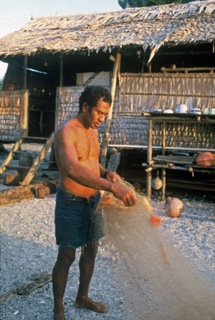Exchanging Custom Fiber Nets for European Robber Nets
Custom net specialist/owners, also owning the requisite giant canoes, were known as “saving people's lives” and “feeding the people”, and ruled with an iron hand in the days of warfare. The relatively small population of Fanalei after WWII could only own and operate one large custom net at a time, compared to Walande’s denser population running two nets at the far north end of the Passage on their own alata. Fanalei’s last handmade fiber net rotted around 1960. Interest had shifted away from the wealth displays of feasting--which demanded big hauls of fish. Over the next decade, people focused more and more on individual cash pursuits (e.g. copra and pig production) even though the cash would end up shared within the clan.
 Nylon mesh gill-nets were introduced by the Fisheries Department in the 1970s and the saltwater Lau were eager to have them. The Lau dubbed them "European robber nets" because they could sneak up on the reef fish and steal them. They hoped these manufactured “cargo” nets would have European powers in a parallel with colonial power, and be optimally, almost magically, effective. “European robber nets” are seen as relatively invisible under water, besides being stronger, breaking less frequently, and making more constant fishing possible by lasting much longer than a bush fiber net.
Nylon mesh gill-nets were introduced by the Fisheries Department in the 1970s and the saltwater Lau were eager to have them. The Lau dubbed them "European robber nets" because they could sneak up on the reef fish and steal them. They hoped these manufactured “cargo” nets would have European powers in a parallel with colonial power, and be optimally, almost magically, effective. “European robber nets” are seen as relatively invisible under water, besides being stronger, breaking less frequently, and making more constant fishing possible by lasting much longer than a bush fiber net.
In 1974, when the Fanalei Village Fund led by the chief purchased one of the Fisheries Department's new nylon nets, locals criticized its rectangular shape. Fanalei’s old custom net specialist/owner set about reworking the nylon to give it the belly of the custom net. Encouraged by Anglican sermons on unity, Fanalei villagers did try a novel approach, making it a Village Nylon Net, having been bought with Village Funds and thought to be imbued with European power. The new nylon net, however, failed, disintegrating since nobody was granted the responsibility for its care. It had lacked a guardian in contrast to a custom net that always had a designated net specialist/owner whose prestige and power directly benefited from his custom knowledge and discretion.
Everyone initially treated the large nylon net from the "cargo" world as separate from custom, not needing fishing spirits or specialist/owners. Yet watching this nylon fail, they quickly tried to incorporate it into custom. The chief assigned a specialist/owner, who has remained the net specialist/owner for the Fanalei's subsequent large nylon nets. Most important, the sacred bird float imbuing spiritual power—which traditionally marks the central belly of the custom net in the water—started being stored with the nylon net to lend power. Therefore, in good syncretic fashion, they melded the “cargo” mystique, of the European robber net with the all-important strengths of the net specialist/owner, guardian of local spirits and gifted with the ability to give the proper belly.








